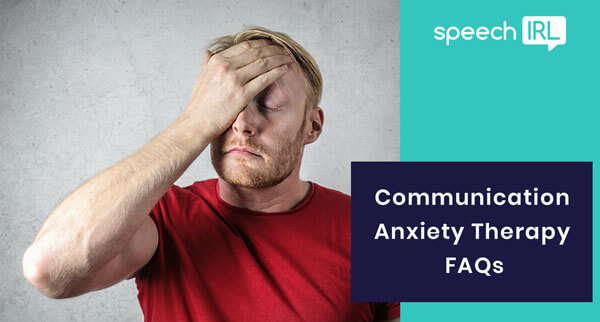As some of the stigma around therapy of all kinds is removed, we’re beginning to discover new attitudes, stressors, or behaviors in ourselves that we may want to address in some therapeutic setting. In identifying some of these for yourself, you may have come to learn about “communication anxiety” and “communication anxiety therapy” — but what does that mean?
Here, our clinician Michelle answers some of the most popular questions surrounding communication anxiety therapy, and how you can determine if this course is right for you.
What is “communication anxiety therapy”? Is this a kind of speech therapy?
I think of it as an inside-out, “whole person” approach to ease and manage communication-related anxiety, instead of the “fake it till you make it” advice out there. I use a mindfulness-based method — awareness of the present moment — to help clients gain more awareness and control of their thoughts and feelings in anxiety-provoking situations like presentations or even one-on-one conversations. They can then understand how this affects different areas of communication, and this enables them to make specific choices about their communication (i.e., rate of speech, tone of voice, breath support, etc.). These, in turn, make them appear, and actually feel more comfortable and confident.
What are some reasons why people struggle with communication anxiety at a level where speech therapy is warranted?
The most common reason I see is that someone’s communication anxiety negatively impacts their work performance. They feel they aren’t able to advance as much as they’d like in their career, and/or they have a lot of discomfort presenting to groups or speaking in front of others at meetings. I also often hear that my clients have a lot of difficulty with networking and other work-related social events. Someone isn’t able to be as involved in certain group activities or as engaged socially as they’d like to be, which can make people feel isolated and really have a negative impact on their happiness and life.
Does communication anxiety affect all areas of communication, like personal and professional or private and public speaking?
Absolutely. Although public speaking is probably the most common anxiety-inducing communication scenario, people can experience varying degrees of anxiety and discomfort with any situation that involves communicating with another person or group of people.
What’s the difference between speech therapy for communication anxiety, versus psychotherapy or counseling for communication anxiety?
Speech therapy for communication anxiety is focused on understanding and learning how to perform specific communicative behaviors that result in increased comfort and confidence while speaking. This requires an awareness and acceptance of what you may be feeling and thinking in a certain situation, and you then turn your attention to choosing the communication behaviors that will make you appear, and actually be, less nervous or uncomfortable.
What are examples of activities or skills that are learned in communication anxiety therapy?
I always start with mindfulness-based activities that increase someone’s ability to just *be* in the present moment and act as observers of their thoughts and feelings. This is the foundation of communication anxiety therapy. Then, we discuss communication behaviors — such as tone of voice, pace of speech, volume of speech, how much they say when responding to a question, etc. — and how those influence the listeners’ perception, as well as possible influences on the speaker’s thoughts and emotions. We then practice choosing productive communication behaviors. This can be done by either engaging in role play situations — such as acting like we just met at a networking event — practicing an upcoming presentation, or just engaging in some small talk or having an actual conversation.
How do I know if I would benefit from communication anxiety therapy, and if I should see a speech-language pathologist, a counselor/mental health therapist, or both?
If you have anxiety that is holding you back from fully living and enjoying your life, I always recommend seeking the guidance of a mental health professional. If you are already working with a mental health professional and/or you feel communicating with others is a primary source of anxiety for you, communication anxiety therapy could be a good option.
We’d love to talk with you more about what we offer, and can be reached at info@speechirl.com.

